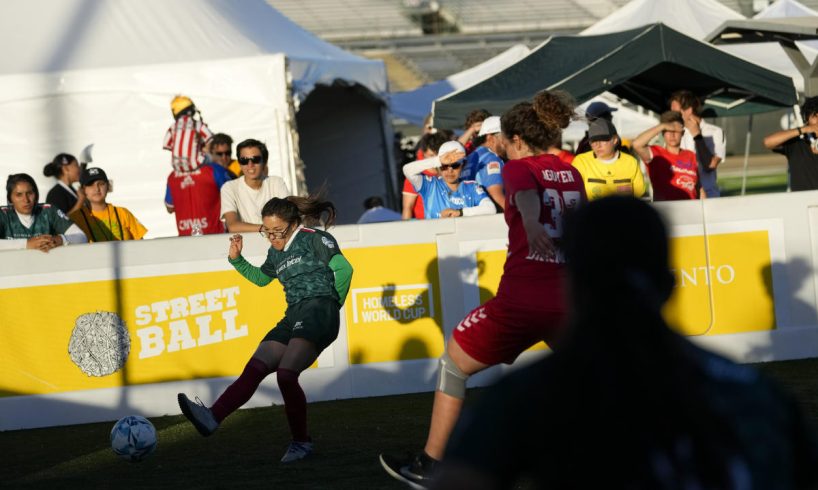
SACRAMENTO, Calif. (AP) — Lisa Wrightsman was a former college soccer player whose life was derailed by drug addiction before she eventually made her way back to the sport through a tournament for players from around the globe who have experienced homelessness.
Wrightsman qualified for the Homeless World Cup in Brazil. It was a competition that would forever change her life. When she returned to Sacramento, friends at the sober living facility where Wrightsman lived told her they wanted “to feel the way you look right now.”
“I actually started to feel value,” she said. “The whole tournament kind of instills you with that.”
Wrightsman is now a coach for the U.S. women’s team in the Homeless World Cup. The tournament made its U.S. debut July 8 in the capital of California, a state home to the largest homeless population in the country. It runs through Saturday.
The tournament is being held after a three-year hiatus due to the pandemic, when homeless populations surged in many U.S. cities. In Sacramento alone, it increased 68% between 2020 and 2022.
Thirty countries are competing in the games with teams that include people who have lived on the streets to refugees to foster children.
They include Yuli Pineda, who moved to California from Honduras and was living with a foster family when she joined. Pineda said she’s found a sense of community playing for the U.S. team.
“Every single player comes from different backgrounds,” Pineda, 18, said. “It’s amazing that in a short amount of time we have connected that fast.”
One of the special parts about soccer is that it is so popular across the globe, said Lawrence Cann, founder of Street Soccer USA, which organizes the U.S. men’s and women’s teams.
“Imagine if you’re isolated, you feel some level of shame with everything that comes along with being homeless,” Cann said. “This gives you a natural way to connect to the largest community in the world, which is the soccer community.”
Mel Young, who co-founded the organization running the tournament, said the aim is to build players’ confidence to achieve their goals beyond the games. Some of the athletes have gone on to play professionally, but that’s not the point, Young said.
“The events are fantastic. I urge anyone to come and watch,” Young said. “But it’s about moving on. It’s about impact. It’s about people changing their lives.”
Young said he has witnessed the transformation. Years ago, Young said he got on a bus in his native Scotland and was surprised to find out the driver was a former player who competed in the tournament. He told Young he got his bus driving license after the games, was living in an apartment and engaged to be married.
Wrightsman grew up in a Sacramento suburb and was a striker for California State University, Sacramento, also known as Sac State. She struggled with drug addiction and ended up in a sober living facility, which made her eligible to qualify for the Homeless World Cup. At the tournament in 2010, she remembered how much she loved playing, and it built her confidence knowing she could share her knowledge with players who were less experienced.
This year, players are battling dry, hot weather in Sacramento, with temperatures set to surpass 100 degrees Fahrenheit (38 degrees Celsius) by Friday. Some of the games were scheduled for later to avoid the most intense heat of the day.
The games are much shorter than traditional soccer matches, lasting only seven minutes each half, so anyone can participate. Each country can bring a men’s and women’s team. Women can compete on the men’s team if the country is not bringing a women’s team.
On a recent day at Sac State’s Hornet Stadium, players tried to cool down by sitting in the shade under bleachers and tents or by placing wet towels around their necks.
In the stands, spectators waved flags and sported jerseys and caps to show support for their country’s team. Supporters of the Mexican women’s team chanted “Si, se puede!” or “Yes, you can!” during a group stage match Tuesday as the reigning champions fought to win their eighth title.
For Sienna Jackson, a 24-year-old Sacramento native on the U.S. women’s team, playing soccer offered a welcome escape from stress growing up.
“It was something to get my mind off of my life and kind of calm me down,” said Jackson, who experienced homelessness for four years starting at the age of 19.
Jackson now lives in an apartment, works with a pediatric dentist and is studying dental assisting at Carrington College, a career-training school in Sacramento.
___
Associated Press journalist Haven Daley contributed.
___
Sophie Austin is a corps member for the Associated Press/Report for America Statehouse News Initiative. Report for America is a nonprofit national service program that places journalists in local newsrooms to report on undercovered issues. Follow Austin on Twitter: @sophieadanna.






